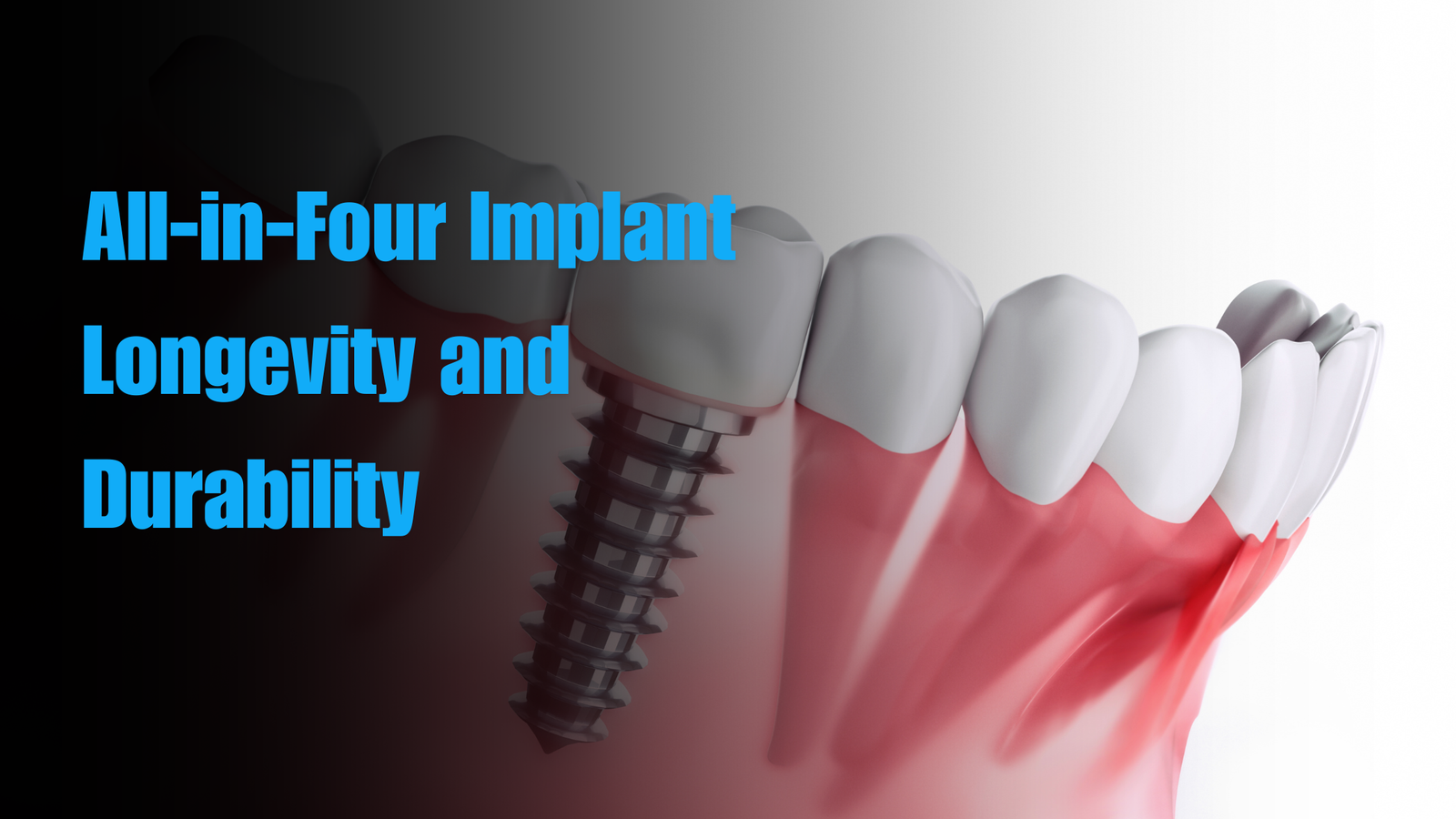All-on-four dental implants have revolutionized the field of restorative dentistry, offering patients a durable and long-lasting solution for replacing missing teeth. This innovative approach involves placing four strategically positioned implants in the jawbone to support a full arch of prosthetic teeth. Known for their strength and stability, All-on-four implants provide numerous benefits, including enhanced aesthetics, improved function, and increased comfort. In this blog, we will explore the factors contributing to the longevity and durability of All-on-four implants, ensuring you can enjoy a healthy, confident smile for years to come.
Understanding the Importance of Longevity and Durability
As a prosthodontist deeply entrenched in the world of dental implants, I have witnessed firsthand the transformative impact of All-on-four dental implants on restoring smiles and enhancing quality of life. Today, we embark on a journey to uncover the secrets behind the longevity and durability of All-on-four implants. These innovative implants have revolutionized the field of implant dentistry, offering patients a reliable and long-lasting solution for replacing missing teeth. From their unique design to the materials used, every aspect of All-on-four implants is meticulously crafted to ensure optimal performance and longevity.
Research has shown that the success rates of All-on-four implants are exceptionally high, with a vast majority of patients experiencing long-term stability and functionality. According to a study published in the International Journal of Oral and Maxillofacial Implants, All-on-four implants have demonstrated a success rate of over 95% at five years post-implantation, highlighting their remarkable durability. This statistic underscores the importance of understanding the factors that contribute to the longevity of All-on-four implants, allowing patients to make informed decisions about their dental health.
How long do all on 4 implants last?
All-on-4 dental implants are designed to be a long-lasting solution for tooth replacement. With proper care and maintenance, they can last 20 years or more, and in some cases, they may last a lifetime. Several factors influence their longevity, including:
-
- Quality of Materials: High-quality materials, such as titanium for the implants and durable prosthetic materials, contribute to the long-term success of All-on-4 implants.
-
- Expert Placement: The skill and experience of the dental surgeon performing the procedure are crucial. Proper placement ensures the implants integrate well with the jawbone.
-
- Oral Hygiene: Maintaining good oral hygiene practices, including regular brushing, flossing, and dental check-ups, is essential for preventing infections and complications.
-
- Lifestyle Factors: Avoiding smoking, excessive alcohol consumption, and maintaining a healthy diet can significantly impact the longevity of All-on-4 implants.
-
- Regular Dental Visits: Routine dental visits allow for monitoring the condition of the implants and addressing any issues early on.
By adhering to these guidelines and following your dentist’s recommendations, you can maximize the lifespan of your All-on-4 dental implants.
Design and Materials of All-in-Four Implants
The success of All-on-four dental implants can be attributed, in part, to their unique design and the quality of materials used in their construction. Unlike traditional implant methods that require individual implants for each missing tooth, All-on-four implants utilize just four strategically placed implants to support an entire arch of prosthetic teeth. This streamlined approach not only reduces treatment time and costs but also minimizes surgical complexity and patient discomfort.
At the core of All-on-four implants lies their construction from high-grade titanium alloy—a material renowned for its strength, durability, and biocompatibility. This titanium alloy ensures that the implants can withstand the forces exerted during chewing and speaking, providing long-term stability and functionality. Additionally, the design of All-on-four implants incorporates specific features, such as tapered shapes and roughened surfaces, which promote osseointegration—the process by which the implants fuse with the jawbone—resulting in a secure and durable foundation for the prosthetic teeth.
Understanding the intricate anatomy of All-on-four implants is key to appreciating their longevity and durability. In the next sections, we will delve deeper into the factors that influence the success of All-on-four implants and provide actionable tips for maximizing their lifespan.
Factors Affecting Longevity and Maintenance
All-on-four dental implants rely on a process called osseointegration to achieve long-term stability and durability. Osseointegration refers to the direct structural and functional connection between the implant surface and the surrounding bone tissue. This biological phenomenon is essential for ensuring the implants become fully integrated into the jawbone, providing a solid foundation for the prosthetic teeth.
The success of osseointegration depends on several factors, including the quality and quantity of the jawbone, the surgical technique used during implant placement, and the patient’s overall health. Adequate bone density and volume are crucial for facilitating osseointegration, as the implants require sufficient support from the surrounding bone to withstand chewing forces effectively.
During the initial healing period following implant surgery, it’s essential to follow proper post-operative care instructions to promote successful osseointegration. This may include maintaining good oral hygiene practices, avoiding excessive pressure on the implants, and refraining from habits such as smoking, which can hinder the healing process.
Regular dental check-ups and maintenance appointments are also critical for monitoring the health of the implants and addressing any issues that may arise. Your dental provider may recommend periodic x-rays to assess the integrity of the bone-implant interface and ensure optimal osseointegration.
By prioritizing bone integration and implementing diligent maintenance practices, patients can significantly enhance the longevity and durability of their All-on-four dental implants, ensuring they continue to function effectively for years to come.
Research and Statistics on All-on-four Implant Success Rates
The success rates of All-on-four dental implants have been extensively studied and documented in the scientific literature. Numerous clinical studies and research articles have demonstrated the high level of success and patient satisfaction associated with All-on-four implant procedures.
A comprehensive review published in the Journal of Oral Implantology analyzed the outcomes of All-on-four implant treatments across multiple studies. The review concluded that All-on-four implants consistently achieved success rates exceeding 95% over various follow-up periods, ranging from one year to ten years post-implantation. These findings highlight the reliability and durability of All-on-four implants as a long-term solution for edentulous patients.
Furthermore, research has shown that All-on-four implants offer significant advantages over traditional implant methods in terms of treatment outcomes, patient comfort, and cost-effectiveness. Their simplified surgical protocol and ability to support the immediate loading of prosthetic teeth make them an attractive option for patients seeking expedited and predictable results. You can also check all-on-four implants vs. traditional dental implants.
Tips for Maximizing Longevity and Durability
Maintaining the longevity and durability of All-on-four dental implants requires proactive care and attention to oral health. Here are some essential tips to help maximize the lifespan of your implants:
Adopt a Rigorous Oral Hygiene Routine: Brush your teeth at least twice a day with a soft-bristled toothbrush and fluoride toothpaste. Floss daily to remove plaque and debris from between the teeth and around the implants. Consider using an antimicrobial mouthwash to reduce the risk of infection.
Attend Regular Dental Check-ups: Schedule routine dental visits every six months or as recommended by your dentist. These appointments allow your dental provider to monitor the health of your implants, identify any issues early on, and provide professional cleanings to maintain oral hygiene.
Protect Your Implants: Avoid habits that can damage your implants, such as chewing on hard objects, using your teeth as tools, or clenching/grinding your teeth (bruxism). Wear a mouthguard if you participate in sports activities to protect your teeth and implants from injury.
Maintain a Healthy Lifestyle: Eat a balanced diet rich in fruits, vegetables, lean proteins, and whole grains to support overall oral health and bone density. Limit consumption of sugary foods and beverages, as they can contribute to tooth decay and gum disease.
Quit Smoking: Smoking can compromise the success of dental implants by impairing blood flow to the gums and bone tissue, delaying healing, and increasing the risk of implant failure. If you smoke, consider quitting to improve the long-term prognosis of your implants.
Address Dental Issues Promptly: If you experience any signs of implant-related complications, such as pain, swelling, looseness, or changes in the fit of your prosthetic teeth, contact your dental provider immediately for evaluation and treatment.
By following these tips and incorporating them into your daily routine, you can help ensure the longevity and durability of your All-on-four dental implants, allowing you to enjoy a healthy and functional smile for years to come.
Common Challenges and How to Overcome Them
While All-on-four dental implants boast high success rates and longevity, they are not immune to challenges and complications. Here are some common issues that patients may encounter and strategies for overcoming them:
Peri-implantitis: This condition, characterized by inflammation and infection around the implant site, can lead to bone loss and implant failure if left untreated. Prevention is key, so practice good oral hygiene and attend regular dental check-ups for early detection and intervention.
Implant Failure: In rare cases, implants may fail to integrate with the surrounding bone tissue or may become loose over time. Factors such as poor bone quality, inadequate surgical technique, or systemic health conditions may contribute to implant failure. Address any concerns with your dental provider promptly to explore potential solutions.
Prosthetic Issues: Problems with the prosthetic teeth, such as fractures, wear, or poor fit, can affect the functionality and aesthetics of your smile. Regular maintenance and adjustments by your dental provider can help ensure the longevity and optimal performance of your prosthetic teeth.
Bone Resorption: Over time, the jawbone may undergo resorption (loss of bone volume), which can impact the stability and aesthetics of your implants. Bone grafting procedures may be necessary to augment the bone volume and support the implants adequately.
By being aware of these potential challenges and collaborating closely with your dental provider, you can address any issues promptly and maintain the longevity and durability of your All-on-four dental implants for years to come.
Ensuring a Lasting Smile with All-on-Four Implants
As a prosthodontist committed to delivering exceptional dental care, I’ve witnessed firsthand the life-changing benefits that All-on-four dental implants can provide to patients with missing teeth. Their remarkable success rates, combined with advancements in technology and materials, make them an ideal solution for restoring smiles and improving quality of life.
By understanding the factors that contribute to the longevity and durability of All-on-four implants and implementing proactive care strategies, patients can enjoy the confidence of a lasting smile for years to come. From maintaining optimal oral hygiene to addressing potential challenges as they arise, taking a proactive approach to implant care is essential for ensuring the continued success of your dental implant journey.
If you’re considering All-on-four dental implants for your smile restoration needs, I invite you to schedule a consultation at All On 4 Dental Implant Today. Our team of experienced professionals is dedicated to providing personalized care and helping you achieve the smile of your dreams. Contact us today to take the first step towards a lifetime of confidence and vitality with All-on-four implants.
Sources:
-
- [International Journal of Oral and Maxillofacial Implants](https://www.ijo-implants.com)
FAQs
All-in-Four dental implants can last 20 years or more with proper care and maintenance. Some patients enjoy their implants for a lifetime.
Several factors influence the longevity of All-in-Four implants, including the quality of the materials used, the expertise of the dental surgeon, the patient’s oral hygiene habits, and lifestyle factors such as smoking and diet.
Yes, All-in-Four implants are designed to be as strong and functional as natural teeth. They provide a stable and secure foundation for prosthetic teeth, allowing patients to eat, speak, and smile confidently.
Caring for All-in-Four implants involves maintaining good oral hygiene practices, including brushing twice daily, flossing, and attending regular dental check-ups. Your dentist will provide specific care instructions tailored to your needs.






